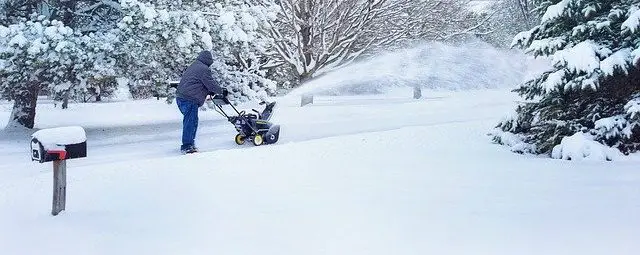Although shovels might work for walkways and some stairs, it doesn’t work for patios and driveways. Snowblowers are more effective, fast, and relatively easy to use. It will clear blankets of snow from your home in a short while. Additionally, it has an adjustable chute deflector that allows for easy disposal of the snow. However, many people have wondered if snowblowers have air filters. This article provides a clear answer to that question. By the end of this article, you’d have answers to:
- Do snowblowers have air filters?
- How do you maintain your snowblower for smooth operation?
Now that you’re aware of what is covered, let’s dive right in.
Contents
Do Snowblowers Have Air Filters?
The simple answer to that is no. Although most motors might not run or develop issues without an air filter, a snowblower is different. This machine works differently and operates smoothly without an air filter. Although you might come across some snowblowers with an air filter from time to time, the majority don’t have one.
Having an air filter on your snowblower could significantly reduce its operational life. Snowblowers have an overwhelming amount of snow moving through their system most of the time. If there’s an air filter, it could get clogged up, which would prevent the snowblower’s optimum operation. Additionally, snowblowers work in winter when there’s no dust, so that an air filter would be entirely unnecessary in this machine.
Snow Blower Maintenance Service Tips
Maintaining your snowblower can be pretty straightforward. There are some maintenance activities you should carry out before, after, and even during the use of your snowblower. However, maintenance is quite crucial for the smooth operation of your snowblower. Below are top maintenance tips to ensure a smooth operation.
1. Learn the Basic
Even with a warranty, maintenance is vital for your snowblower. There are different types, and while they vary in the maintenance type, they still require it. Basic maintenance replaces the spark plug every year, monitoring the oil level, gas level, and lubrication. You also need to ensure the rubber belts and paddles are in excellent condition.
2. Check for Loose Bolts or Pins
Before and after using your snowblower, ensure you check for any loose fittings. Although sometimes loose pins and bolts are a manufacturer’s defect, you need to care for them. Twist all exposed bolts before and after using the snowblower. Learn the position of each nut and bolt, so you can tell when they’re missing.
3. Unclogging the chute
There will be times when the snowblower’s chute gets clogged. Most of the time, it happens when you’re dealing with heavier snow. You need to learn how to unclog the chute in such a situation. If it gets clogged, use the clean-out tool to get rid of blockages.
4. Clean the Snowblower After Every Use
If you leave your snowblower without cleaning after every use, you could cause damage to it. When snow and ice build-up on the snowblower, it usually affects its functionality. That’s why cleaning out the snowblower after usage is vital. Use the long-handled brush to wipe the snowblower. Also, unplug the spark plug to ensure safety. You can also use the clear-off tool to wipe off ice and snow in your machine.
- How to Get Potatoes to Sprout Eyes: Detailed Growing Guide with 3 Options - July 31, 2023
- Weight of a Medium Potato: Revealed in Detailed Guide - July 29, 2023
- Maris Piper Potatoes: 9 Substitutes You Should Know About - July 27, 2023
Hello! I’m Jessica Zander, a garden coach and consultant based in the Boston area (zone 6b), offering virtual consultations across the country and Canada.
I’ve been passionate about gardening since the early 1990s, and in 2022, I launched You Can Do It Gardening to empower individuals to feel more confident in their gardening endeavors.
Following a 30-year career in nonprofit finance and operations, I transitioned out of that field in mid-June of 2023 due to the growing demand for coaching services. Interestingly, my years of presenting financial statements to boards and finance committees proved to be valuable experience for teaching people about gardening! I enjoy sharing skills, providing guidance and suggestions, and collaborating efficiently with clients to make significant improvements to their outdoor spaces, both small and large. I also regularly teach at the Arlington Continuing Education and Cambridge Adult Education.
My approach is direct and practical, akin to Mary Poppins, but tailored to your garden. Clients find satisfaction in saving money and taking pride in their own gardening achievements.


Add comment